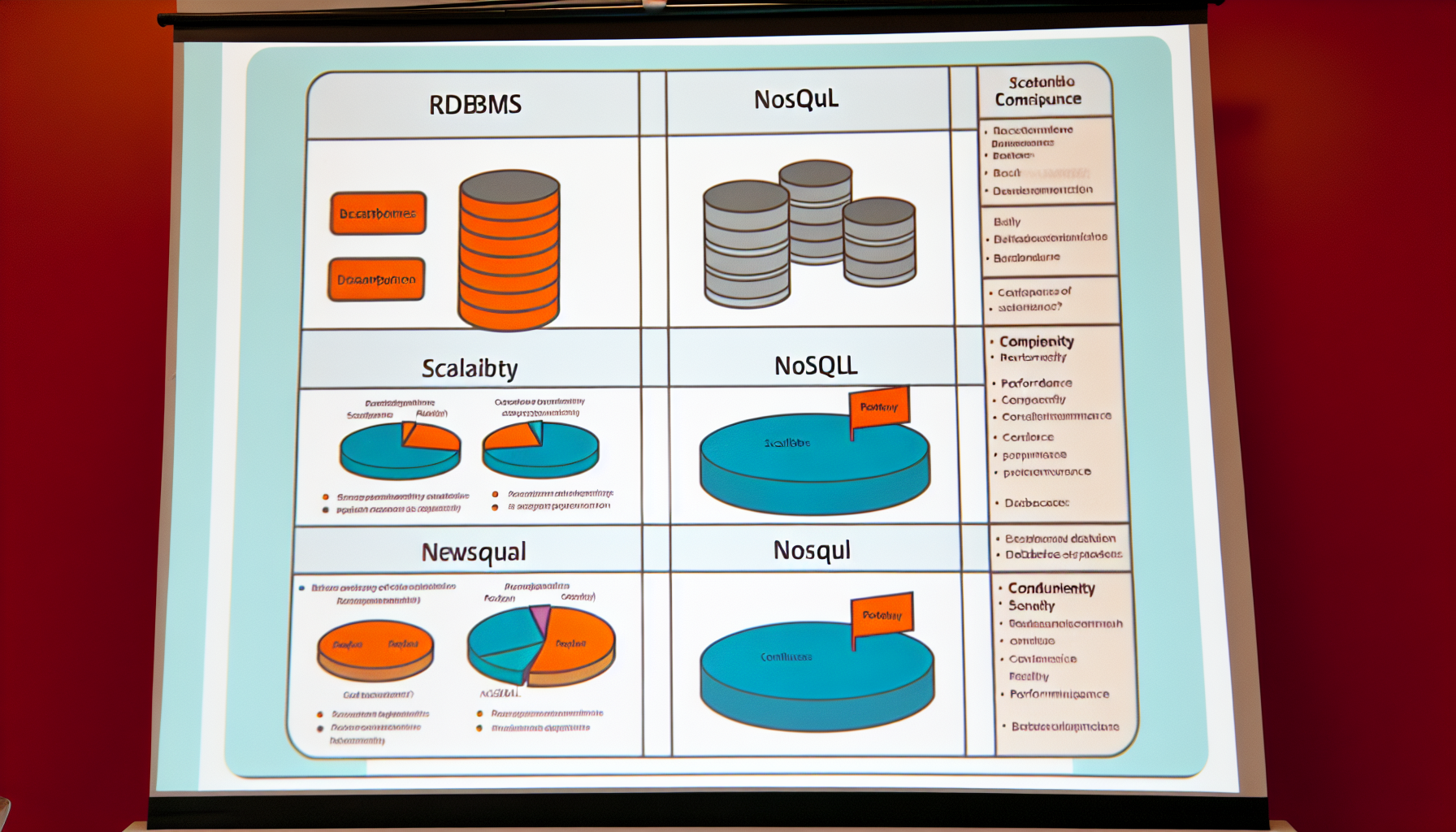The Future of SQL Databases: Insights and Trends for Los Angeles Developers
The Evolution of Data Storage: From RDBMS to NoSQL and NewSQL
The landscape of data storage has undergone a significant transformation over the years. Traditional relational database management systems (RDBMS) have been challenged by the emergence of NoSQL and NewSQL databases, each bringing its own set of capabilities to the table. As stated by BairesDev, “In the end, none of the most popular databases covered here is the one true DB to rule them all, each has their strengths and weaknesses and are designed to solve specific problems…” (source). This diversity offers developers flexibility but also necessitates a keen understanding of the underlying technologies to make informed decisions.
In Los Angeles, a hub for innovation and technology, the choice of data storage solutions is critical for the success of applications across industries. Whether it’s entertainment, healthcare, or finance, the database selected must align with the application’s requirements for scalability, performance, and data consistency.
As we move towards Database management trends 2024, it’s evident that the selection process will become even more nuanced, with hybrid solutions often providing the most effective approach to managing complex data landscapes.

SQL’s Enduring Reign as the Universal Data Language
Despite the proliferation of database technologies, SQL remains the lingua franca of data manipulation and retrieval. Its enduring presence is a testament to its flexibility, power, and widespread adoption. SQL’s syntax and principles have stood the test of time, serving as the foundation for many database systems and ensuring that SQL training in Los Angeles remains a sought-after skill for developers.
Moreover, platforms like Azure SQL Database demonstrate SQL’s adaptability in the cloud. Microsoft highlights the versatility of Azure SQL Database, noting, “You can use various programming languages and platforms to connect and query Azure SQL Database…” (source). This universality is a key factor in SQL’s continued relevance in the modern development landscape.
For developers in Los Angeles, mastering SQL is not just about understanding a programming language; it’s about gaining the ability to interact with a wide array of database systems, ensuring that their applications can leverage the full power of data storage and retrieval mechanisms.

Meeting the Demands of Scalability and Performance in App Development
The demands for scalability and performance are ever-increasing in the world of app development. With the proliferation of mobile devices and the Internet of Things (IoT), applications must be designed to handle vast amounts of data while providing a seamless user experience. The key to achieving this lies in the database’s ability to scale and perform under heavy loads.
When it comes to mobile app development, the choice of database is paramount. As Simform suggests, “Whether you are building a brand new mobile application or want to add more features to the existing app, choosing the right database can be overwhelming given all the choices available today…” (source). Developers must weigh factors such as data structure, query complexity, and real-time processing needs when selecting a database for their mobile applications.
In Los Angeles, where the app market is highly competitive, developers must stay abreast of the latest database solutions that offer the scalability and performance necessary to support their applications’ growth and user demands.
Ensuring Data Security and Integrity in the Age of Cyber Threats
As cyber threats continue to evolve, the importance of data security and integrity cannot be overstated. Protecting sensitive information from unauthorized access and ensuring that data remains consistent and accurate are paramount concerns for developers and businesses alike.
Database systems come equipped with a range of security features, from encryption to access controls, that are essential in safeguarding data. However, the responsibility also lies with developers to implement best practices and stay informed about the latest security trends and threats.
In the bustling tech ecosystem of Los Angeles, where startups and established companies are frequent targets of cyber-attacks, a proactive approach to database security is a necessity. It’s not just about protecting data; it’s about maintaining trust and ensuring the longevity of digital products.
Leveraging SQL for Advanced Analytics and Business Intelligence
SQL’s capabilities extend far beyond basic data manipulation. In the realm of advanced analytics and business intelligence, SQL serves as a powerful tool for extracting insights and driving data-driven decision-making.
Los Angeles, with its diverse economy and thriving business sector, is a fertile ground for big data analytics. Companies are increasingly turning to SQL-based analytics to gain a competitive edge, uncover trends, and optimize operations.
For developers, this means that proficiency in SQL is not just about building applications; it’s also about enabling businesses to harness their data for strategic advantage. The ability to query, analyze, and visualize data effectively is a skill that will remain in high demand as we move into Database management trends 2024.
Managing the Data Deluge: IoT Data Storage Solutions and Big Data Analytics
The Internet of Things (IoT) has led to an explosion of data, with devices generating vast streams of information that need to be stored, processed, and analyzed. Managing this data deluge requires specialized IoT data storage solutions and robust big data analytics capabilities.
In Los Angeles, where IoT adoption is on the rise across sectors such as transportation, healthcare, and smart city initiatives, the challenge is to implement data storage solutions that can keep pace with the volume, velocity, and variety of IoT data.
Big data analytics Los Angeles has become a critical component in making sense of the data generated by IoT devices. Through analytics, businesses can derive actionable insights, optimize their operations, and create new value for customers. For developers, this represents an exciting opportunity to be at the forefront of innovation in data management and analytics.
The Rise of Cloud Database Services LA and the Shift to DBaaS
Cloud database services have revolutionized the way data is managed and stored. In Los Angeles, the adoption of Database as a Service (DBaaS) models is accelerating, driven by the need for flexibility, scalability, and reduced overhead.
Cloud database services LA offer developers and businesses the ability to offload the complexities of database management, focusing instead on application development and innovation. With the cloud, databases can be provisioned and scaled with ease, providing a level of agility that is essential in today’s fast-paced technological landscape.
As we look towards the future, the shift to DBaaS is expected to continue, with more companies embracing the cloud for its cost-effectiveness and operational benefits. For developers in Los Angeles, understanding cloud database services is becoming increasingly important.
The Simplification of Data Interaction: The Role of ORMs and Abstraction Layers
Object-Relational Mapping (ORM) tools and abstraction layers have simplified the way developers interact with databases. By providing a bridge between object-oriented programming languages and relational databases, ORMs have made data interaction more intuitive and efficient.
DronaHQ points out the importance of database GUIs, stating, “The following tools gives you the flexibility to manage, develop, and easily administer database…” (source). These tools are an integral part of the modern developer’s toolkit, allowing for quick modifications, queries, and administration without the need for deep SQL expertise.
In a city like Los Angeles, where time-to-market can be a critical factor for success, the role of ORMs and database GUIs in streamlining development workflows cannot be overstated. They enable developers to focus on creating innovative applications rather than getting bogged down in database intricacies.
Peering into the Crystal Ball: Database Management Trends 2024
As we look ahead to Database management trends 2024, several key developments are poised to shape the future of database management. These include the continued growth of AI and machine learning integration, the rise of edge computing, and the increasing importance of data governance and compliance.
For Los Angeles developers, staying informed about these trends is crucial. The city’s dynamic tech scene demands a forward-thinking approach to database management, one that anticipates the needs of tomorrow and embraces the innovations of today.
By keeping an eye on the horizon and adapting to emerging trends, developers can ensure that their skills and solutions remain relevant and effective in the evolving digital landscape.
SQL Training Los Angeles: Empowering Developers in the App Revolution Era
The app revolution shows no signs of slowing down, and SQL training in Los Angeles is more important than ever for developers looking to thrive in this era. As applications become more complex and data-driven, a solid foundation in SQL is essential.
SQL training provides developers with the knowledge and skills needed to design, implement, and maintain robust database solutions. It empowers them to tackle the challenges of modern application development, from data modeling to performance optimization.
For those seeking to enhance their expertise or embark on a career in development, SQL training in Los Angeles offers a pathway to success in a city that is a powerhouse of technological innovation and opportunity.
Are you ready to elevate your database management capabilities and stay ahead of the curve in Los Angeles’s competitive tech landscape? Visit Bee Techy to get a quote and discover how our expertise can help you harness the full potential of SQL databases in your projects.
